
 |
|
|
|
After a patriotic rewrite for wartime audiences, Ernest Hemingway's novel To Have and Have Not became the classic 1944 Howard Hawks movie with Humphrey Bogart and Lauren Bacall. It was also later revisited in the weak adaptation The Gun Runners, with Audie Murphy. But the technically most faithful version of Hemingway's original seagoing adventure is Michael Curtiz' 1950 The Breaking Point. One of the last films John Garfield made while under attack by the political predators of the House Un-American Activities Committee, The Breaking Point is a hard-edged film noir with a slight subversive streak. Its cash-strapped hero feels compelled to commit criminal acts by an unforgiving economic situation, until he reaches his 'breaking point'. Hemingway's Depression-Era tale adapts well to the boom year of 1950, where the illusion of nationwide prosperity isn't being felt at the lower levels of the working class. Star Patricia Neal said that of all his works, Ernest Hemingway liked this film adaptation the best. 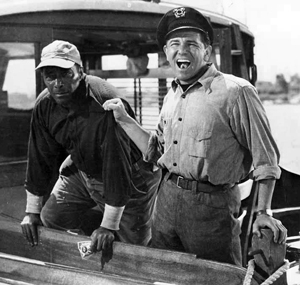
Instead of a bachelor adventurer looking for love and loyalty in the Caribbean, Point's Harry Morgan (John Garfield, never better) is a married veteran with two kids, having trouble keeping up the payments on his fishing-touring boat. His wife Lucy (Phyllis Thaxter) wants Harry to quit and work for her father, a prosperous farmer. Things look up when Harry gets a charter to carry the wealthy Hannagan (Ralph Dumke) and his blonde mistress Leona Charles (Patricia Neal) to Mexico for a few days' fishing and gambling. But Hannagan strands Harry and his first mate Wesley Park (Juano Hernandez) in Ensenada without funds to even buy gas for the to return to Newport Beach. Desperate, Harry agrees to a deal set up by the shady lawyer/middleman Duncan (Wallace Ford): he'll smuggle a group of Chinese illegals into the U.S. for the sinister Mr. Sing (Victor Sen Yung). Already interested in seducing Harry, Leora stows away, not realizing what she's getting herself into. The Breaking Point is disturbing because, more than most noirs of its ilk, it makes a persuasive argument for the hero's turn to wrongdoing. Ex- Navy PT boat captain Harry Morgan's entire identity is wrapped up in his fishing boat; it's his dividing line between success and failure. It's also the only thing between him and landlubber work on a lettuce farm. Morgan represents the millions of returning servicemen who didn't fit into the postwar prosperity bubble. Five years after the victory, his fishing fleet hasn't materialized and he's fighting a losing battle to keep his boat. Faithful Lucy understands this, but she probably won't understand why he accepts contraband cargo. 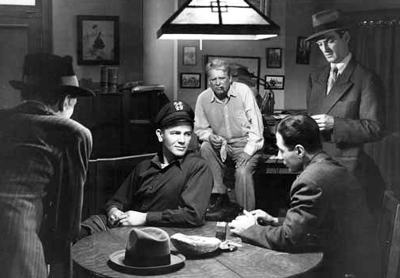
Other pressures are just as powerful. Morgan's faithful and moral first mate Wesley, a black man, is a nagging conscience to do the right thing. The crooked lawyer Duncan continually tempts Morgan with criminal "opportunities" to get himself in the clear, urging him to stop being so uptight about the law, to "relax and let it happen". Of course, falling in with Duncan is the worst thing Morgan could do. Not only do Duncan's crooked associates not keep up their end of the bargain, Duncan uses Morgan's involvement as a wedge to force him into assisting an even bolder crime, a bank robbery. The Breaking Point shows how a good man allows himself to slide to the wrong side of the law. When the Coast Guard officer impounds Harry's boat for suspicious activity, and the boat owner comes to repossess it, Harry decides that everybody is against him. He formulates a crazy plan to double-cross the bank robbers on the high seas. Using a great deal of location photography, this version is far more naturalistic than the elaborate studio sets of the earlier Bogart movie, or the Warners/Garfield dockside mystery Out of the Fog. Harry Morgan's "noir" dilemma partially plays out in a sunny canal-side bungalow with two boisterous daughters and a wife who can't pay the bills. He resists the provocative come-ons from the playgirl Leora, who quietly offers herself to him almost as soon as they meet. Patricia Neal's teasing grin and "let's play" eyes are nearly irresistible. Morgan bends but does not break under Leora's enticements, which is why we still side with him. Harry Morgan would be a noir "loser", except that he refuses to cave in to despair and elects instead to set up his own deadly anti-gangster ambush. That makes him a severely tainted, and therefore very modern, hero. 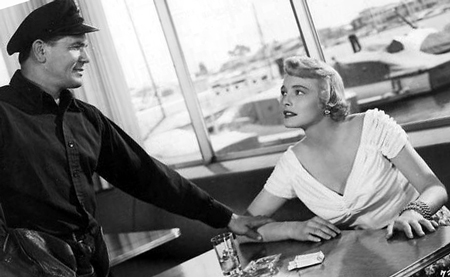
Made in 1950, The Breaking Point is also one of the last major-studio noir features that can be said to carry a strong subversive undercurrent. The tide of reactionary opportunism was already rising against star John Garfield, who was one of the original group of actors to go to Washington in defense of the Hollywood Ten. When the Coast Guard impounds his boat, Morgan complains that the government is "taking away his livelihood, his only way of earning a living", the main complaint of blacklistees forced to plead guilty to non-crimes and inform on their friends and associates. Harry Morgan's economic dilemma makes a good comparison/contrast to that of Howard Tyler in Cyril Endfield's openly subversive Try and Get Me! 1 Director Michael Curtiz is in top form here. His often overly compressed studio style has adapted into something more relaxed, pointing to the new decade of '50s noir with its mix of stylized and semi-docu visuals. The film is as carefully lit and controlled as any Warners item from its year, but the dark shadows no longer seem to be hiding deep psychological secrets. Ted McCord's cinematography reflects the sharp California sunlight; much of the rear projection process work is invisible. The previous year's White Heat pushed the traditional Warners gangster style into a kind of visual insanity, a graphic overkill; The Breaking Point looks and "feels" much more modern. By comparison, James Cagney's next picture Kiss Tomorrow Goodbye seems a return to the filmic textures of the early 1940s. 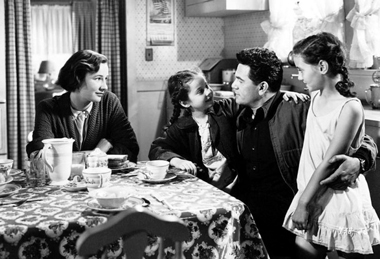
John Garfield is amazing, a mass of virility, integrity, toughness and resentment, who also feels a strong love for his wife and kids. Phyllis Thaxter, the perfect WW2 spouse of Thirty Seconds Over Tokyo, projects concern without being a nag, and is shaken only when she thinks that the predatory Leora might have made a claim on her man. Lucy does her best to steer Harry in the right direction by threatening to leave if he gets involved in any more criminal acts. We know that she will stick to Harry no matter what, but Harry believes her. Patricia Neal convinces us that she's a real firecracker, an anything-goes sensationalist who gains respect for Harry as she sees what he's really made of. Making a special impact as one of noir's slimiest shysters is the veteran Wallace Ford. The lawyer Duncan proves the corruption of the system, simply by the fact that the law allows him to walk free. He shows up like a bad penny, always eager to compromise Harry for his own profit, and dishing out the worst advice possible: "Don't worry about it, let it happen." The weird thing is that when Duncan is put on the spot, he gains our sympathy as well. 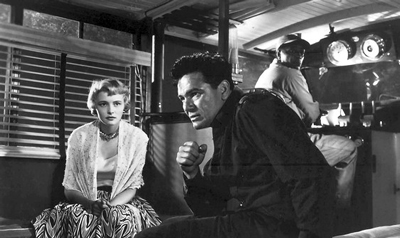
And finally there's Juano Hernandez's Wesley, who is much more than a sidekick. Hernandez doesn't try to top Walter Brennan's sublimely comic "rummy" Eddie from the Bogart picture. Hernandez instead plays it straight, in what is clearly a thoughtful statement about race. Just like Harry, Wesley must stay employed to care for his young son, who goes to school with Harry's girls. (For a 1950 film, that is itself a strong racial statement.) Morgan can't possibly appreciate Wesley enough, a fact driven home when Morgan learns how costly his desire to "stay ahead of the game" can be to people he loves. The movie never implies that Morgan's friendship with Wesley is a social hindrance to his business. If the film forced a detail like that into the stew, The Breaking Point would seem more of a pointedly radical statement, like Try and Get Me! But screenwriter Ranald MacDougall and director Curtiz leave us with a haunting final image that acknowledges the callous way that black characters are excluded and dismissed in so many Hollywood films. 
The Warner Archive Collection's DVD-R of The Breaking Point is a stunning B&W transfer of this unjustly-neglected winner, easily a top noir title for suspense and romantic intrigue. To Have and Have Not may be the Hollywood classic but The Breaking Point is the better, more accomplished suspense thriller. The film was shown only infrequently on television; I've learned that a legal barrier was only recently broken, allowing its release on home video. I shouldn't make guesses, but the likely sticking point was the literary source.
On a scale of Excellent, Good, Fair, and Poor,
The Breaking Point rates:
Footnote:
1. In Try and Get Me! Howard Tyler is also an ex- G.I., a tank jockey having an even tougher time staying employed after the war. He also has a young child with another on the way, and a concerned wife. But Howard's situation is much more dire. He lives in a shack and his wife fears that they cannot afford a doctor for the delivery. Having relocated to a new town, Howard has no friends and little hope. He loses what self-pride he has when he falls in with a psychopathic stick-up man. In contrast, Harry Morgan has plenty of options. His wife is supportive and he has the loyal friendship of Wesley; even Leora is faithful in her way. The Coast Guard officer bears him no ill will when he (rightly) suspects him of foul play on the high seas. The owner of Morgan's boat is a reasonable man -- he gives him some extra time to come up with his missed payments. Unlike Howard Tyler, Harry Morgan does not feel defeated by "society in general". He's fighting for his independence and his dignity, both of which he'd lose if he gave up and worked for his father in law. He's not an out-of-control alcoholic like Howard. He goes into his wrongdoing with his eyes wide open.
Reviews on the Savant main site have additional credits information and are often updated and annotated with reader input and graphics. Also, don't forget the 2010 Savant Wish List. T'was Ever Thus.
Review Staff | About DVD Talk | Newsletter Subscribe | Join DVD Talk Forum |
| ||||||||||||||||||